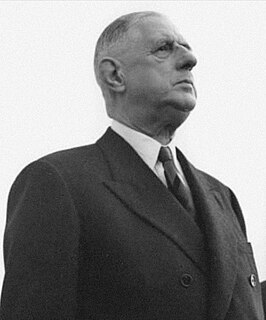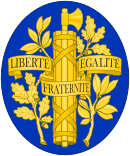A constitutional amendment is a modification of the constitution of a polity, organization or other type of entity. Amendments are often interwoven into the relevant sections of an existing constitution, directly altering the text. Conversely, they can be appended to the constitution as supplemental additions, thus changing the frame of government without altering the existing text of the document.

A constituent assembly is a body assembled for the purpose of drafting or revising a constitution. Members of a constituent assembly may be elected by popular vote, drawn by sortition, appointed, or some combination of these methods. Assemblies are typically considered distinct from a regular legislature, although members of the legislature may compose a significant number or all of its members. As the fundamental document constituting a state, a constitution cannot normally be modified or amended by the state's normal legislative procedures in some jurisdictions; instead a constitutional convention or a constituent assembly, the rules for which are normally laid down in the constitution, must be set up. A constituent assembly is usually set up for its specific purpose, which it carries out in a relatively short time, after which the assembly is dissolved. A constituent assembly is a form of representative democracy.

The current Constitution of France was adopted on 4 October 1958. It is typically called the Constitution of the Fifth Republic(French: Constitution de la Ve République), and it replaced the Constitution of the Fourth Republic of 1946 with the exception of the preamble per a Constitutional Council decision in July 1971. The current Constitution regards the separation of church and state, democracy, social welfare, and indivisibility as core principles of the French state.

The Italian Parliament is the national parliament of the Italian Republic. It is the representative body of Italian citizens and is the successor to the Parliament of the Kingdom of Italy (1861–1943), the transitional National Council (1945–1946) and the Constituent Assembly (1946–1948). It is a bicameral legislature with 600 elected members and a small number of unelected members. The Italian Parliament is composed of the Chamber of Deputies, as well as the Senate of the Republic.
A four-part referendum was held in Ukraine on 16 April 2000. The referendum was called by President Leonid Kuchma, and asked voters whether they approved of four amendments to the constitution that would increase the powers of the President and introduce an upper chamber.

A seven-question referendum was held in Belarus on 24 November 1996. Four questions were put forward by President Alexander Lukashenko on changing the date of the country's independence day, amending the constitution, changing laws on the sale of land and the abolition of the death penalty. The Supreme Council put forward three questions on constitutional amendments by the Communist and Agrarian factions, local elections and the national finances.

A constitutional referendum was held in France on 5 May 1946. Voters were asked whether they approved of a new draft Constitution proposed by the Constituent Assembly elected in 1945.

A constitutional referendum was held in France on 13 October 1946. Voters were asked whether they approved of a new constitution proposed by the Constituent Assembly elected in June. Unlike the May referendum, which saw a previous constitutional proposal rejected, the new Constitution of 27 October 1946 was accepted by 53.2% of voters, and brought the Fourth Republic into existence. Voter turnout was 67.6%.

A referendum on the method of the election of the president was held in France on 28 October 1962. The question was whether to have the President of the French Republic elected by direct popular vote, rather than by an electoral college. It was approved by 62.3% of voters with a 77.0% turnout. The reform was controversial because it strengthened the executive at the expense of Parliament, and because of the disputed constitutionality of the procedure used.

A constitutional referendum was held in French Dahomey and French Togoland on 21 October 1945 as part of the wider French constitutional referendum. In the two territories both questions were approved by large margins. Voter turnout was 83.5%.
An Icelandic Constitutional Council (Stjórnlagaráð) for the purpose of reviewing the Constitution of the Republic was appointed by a resolution of Althingi, the Icelandic parliament, on 24 March 2011. Elections were held to create a Constitutional Assembly (Stjórnlagaþing) body, but given some electoral flaws, had been ruled null and void by the Supreme Court of Iceland on 25 January 2011, leading the parliament to place most of the winning candidates into a Constitutional Council with similar mission. The question of whether the text of the proposed constitution should form a base for a future constitution was put to a non-binding referendum, where it won the approval of 67% of voters. However, the government's term finished before the reform bill could be passed, and the next government has not acted upon it.

A constitutional referendum was held in Ivory Coast on 21 October 1945 as part of the wider French constitutional referendum. Both questions were approved by large margins. Voter turnout was 74.9%.

The 1945 French constitutional referendum in French Somaliland was held in French Somaliland on 21 October 1945 as part of the wider French constitutional referendum.

A constitutional referendum was held in Gabon and Moyen Congo on 21 October 1945 as part of the wider French constitutional referendum. Both questions were approved by large margins. Voter turnout was 68.1%.

A constitutional referendum was held in Guinea on 21 October 1945 as part of the wider French constitutional referendum. Both questions were approved by large margins. Voter turnout was 73.5%.

The 1945 French constitutional referendum in Cameroon was held in French Cameroons on 21 October 1945 as part of the wider French constitutional referendum.

A constitutional referendum was held in Chad and Ubangi-Shari on 21 October 1945 as part of the wider French constitutional referendum. Both questions were approved by large margins. Voter turnout was 83.5%.

A constitutional referendum was held in Mauritania and Senegal on 21 October 1945 as part of the wider French constitutional referendum. The first question on the new French National Assembly serving as a constituent assembly was approved by 99% of voters, but the temporary constitution proposed in the second question was rejected by 51% of voters. Both proposals were approved in the overall vote. Voter turnout was 60.4%.

A constitutional referendum was held in French Sudan and Niger on 21 October 1945 as part of the wider French constitutional referendum. The first question on the new French National Assembly serving as a constituent assembly was approved by 97% of voters, whilst the temporary constitution proposed in the second question was approved by 86% of voters. Both proposals were also approved in the overall vote. Voter turnout was 79.3%.

A constitutional referendum was held in Tunisia on 21 October 1945 as part of the wider French constitutional referendum. The first question on the new French National Assembly serving as a constituent assembly was approved by 99% of voters, whilst the temporary constitution proposed in the second question was approved by 79% of voters. Both proposals were also approved in the overall vote. Voter turnout was 69.2%.
















